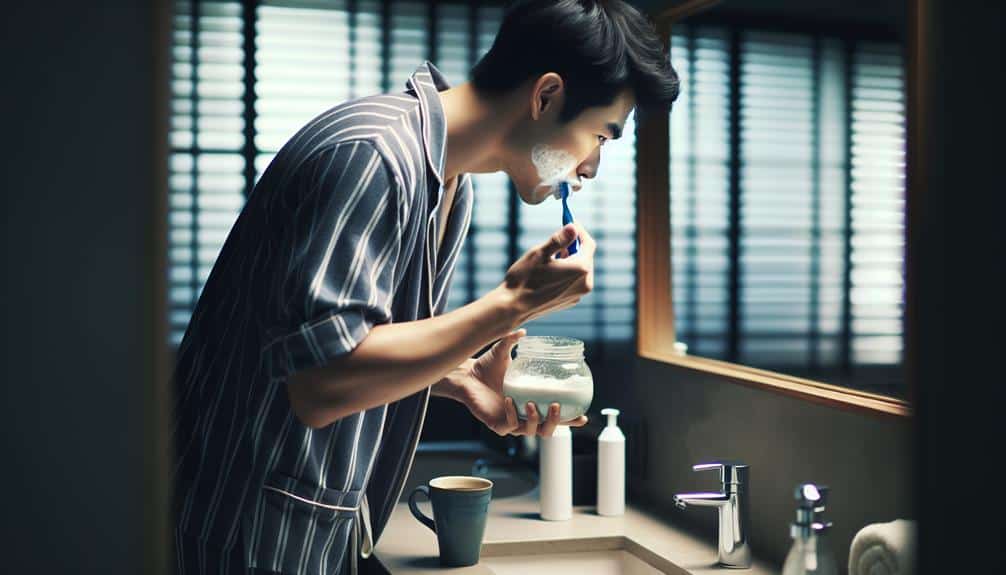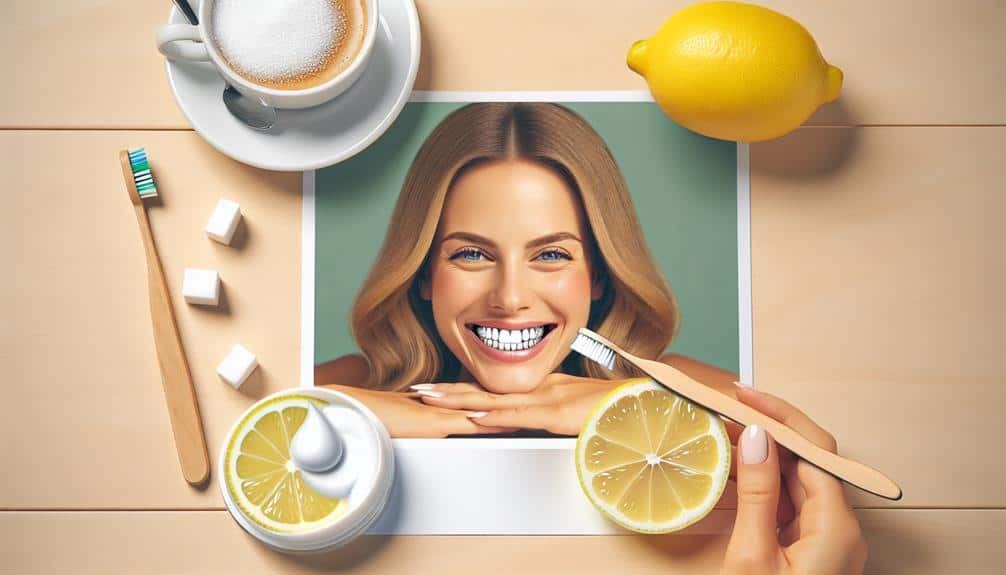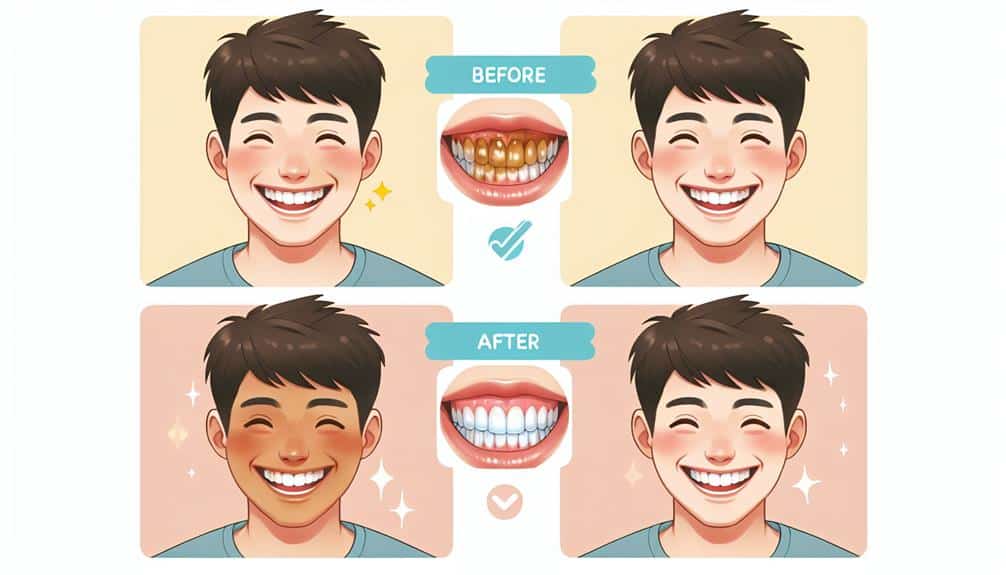Looking to brighten coffee-stained teeth? Try oil pulling—swish oil for 15-20 mins to reduce bacteria and stains. Create a baking soda scrub—gently apply in circles to remove stains. Make DIY toothpaste with baking soda, hydrogen peroxide, peppermint oil, and stevia to whiten teeth gently. Use a lemon juice rinse to brighten, diluted for safety. Try activated charcoal—brush with care or use a mask to absorb stains. These natural methods can help you achieve a brighter smile.
Key Points
- Oil pulling reduces harmful bacteria and whitens teeth naturally.
- Baking soda scrub gently removes stains with mild abrasives.
- DIY toothpaste with baking soda and hydrogen peroxide for whitening.
- Lemon juice rinse has natural bleaching properties for a brighter smile.
- Activated charcoal absorbs surface stains effectively for whiter teeth.
Oil Pulling for Whiter Teeth
To achieve whiter teeth through oil pulling, consistency and patience are key in this natural dental care practice. Oil pulling benefits oral health by reducing harmful bacteria in the mouth, preventing plaque buildup, and whitening teeth. This ancient Ayurvedic remedy involves swishing a tablespoon of oil, such as coconut or sesame oil, in your mouth for about 15-20 minutes on an empty stomach. The oil acts as a natural cleanser, pulling out toxins and bacteria from the mouth, which can contribute to staining.
Oil pulling is one of the alternative remedies for whitening teeth naturally. It's a gentle method that doesn't erode enamel or cause sensitivity like some harsh chemical treatments. Incorporating oil pulling into your daily routine can gradually help in removing surface stains caused by coffee, tea, or other pigmented foods and beverages. Remember, the key to success with oil pulling is consistency. Make it a habit, and over time, you may notice your teeth looking brighter and healthier.
Baking Soda Scrub for Stain Removal
For effective removal of stains on your teeth, utilizing a baking soda scrub can be an important and natural method. Baking soda is known for its mild abrasive properties that can help scrub away surface stains on teeth caused by coffee, tea, or other pigmented foods.
To create a baking soda scrub, mix a small amount of baking soda with water to form a paste. Gently apply this paste to your teeth using a toothbrush in a circular motion. Be cautious not to apply too much pressure as baking soda can be abrasive and may wear down the enamel if used excessively.
When using the baking soda scrub, it's essential to remember that this method isn't a replacement for your regular oral hygiene routine. Brushing with a fluoride toothpaste, using proper toothbrush technique, and incorporating flossing benefits are still important for maintaining good oral health. The baking soda scrub can be used occasionally as a supplementary method to help remove surface stains and brighten your smile.
DIY Whitening Toothpaste Recipe
If you're looking to enhance the whitening effects on your teeth beyond just using a baking soda scrub, consider creating your own DIY whitening toothpaste using simple ingredients. Making a homemade mouthwash is a fantastic way to maintain oral hygiene while also brightening your smile. To craft a natural toothpaste at home, you'll need baking soda, hydrogen peroxide, peppermint essential oil, and a touch of stevia for sweetness.
Start by mixing 2 tablespoons of baking soda with 1 tablespoon of hydrogen peroxide in a small bowl. Add a few drops of mint essential oil for a invigorating taste and aroma. Finally, incorporate a pinch of stevia to balance out the flavors. Stir the ingredients together until you form a smooth paste.
This natural toothpaste recipe offers a gentle yet effective way to whiten your teeth naturally. Use it in conjunction with your regular brushing routine for best results. Remember, consistency is key when aiming for a brighter, stain-free smile.
Lemon Juice Rinse for Brightening
Consider incorporating a lemon juice rinse into your oral care routine to help brighten your teeth naturally and effectively. Lemon juice is known for its citrus benefits that can aid in whitening teeth due to its natural bleaching properties. To create a lemon juice rinse, mix freshly squeezed lemon juice with an equal part of water to dilute its acidity, which can be harsh on tooth enamel if used undiluted.
Once you have your diluted mixture, swish it around in your mouth for about a minute, being careful not to swallow any of the solution. After rinsing, thoroughly brush your teeth with regular toothpaste and then rinse again with water to remove any residual lemon juice.
Please bear in mind that while lemon juice can help brighten teeth, excessive use can erode enamel over time, so it's best to use this rinse sparingly, perhaps once or twice a week. Incorporating this natural remedy into your oral care routine can complement your efforts to combat coffee stains and maintain a brighter smile.
Activated Charcoal for Stain Absorption
To effectively utilize activated charcoal for stain absorption, begin by selecting a high-quality, food-grade product suitable for oral use. Activated charcoal is known for its ability to bind to toxins, including stains on the teeth, and remove them effectively. You can use activated charcoal in two main ways to whiten coffee-stained teeth: through charcoal toothpaste and charcoal masks.
Charcoal toothpaste usually contains activated charcoal as one of its main ingredients. It works by adsorbing surface stains on the teeth, leaving them looking whiter and brighter. When using charcoal toothpaste, brush your teeth gently in small, circular motions for about two minutes, ensuring all surfaces are covered.
Charcoal masks can also be used to whiten teeth. These masks are applied directly to the teeth and left on for a specified amount of time before rinsing off. The activated charcoal in the mask helps to absorb surface stains, revealing a cleaner and brighter smile. Remember to use these methods in moderation to avoid excessive wear on the enamel.
Frequently Asked Questions
How Long Does It Take to See Results From Oil Pulling for Whiter Teeth?
You'll notice a difference in your teeth's brightness after consistent coconut oil pulling. Like a sunrise illuminates the sky, the effectiveness of coconut oil increases with regular use. Results generally appear within a few weeks.
Can Baking Soda Scrub Cause Damage to Tooth Enamel?
Using baking soda as a scrub can potentially damage tooth enamel due to its abrasive nature. To protect your enamel, it's advisable to use gentler options like whitening toothpaste or professional dental treatments.
Are There Any Risks Associated With Using the DIY Whitening Toothpaste Recipe?
As you navigate the world of DIY risks, ponder the toothpaste safety. Although some recipes promise gleaming results, exercise caution. Ingredients like lemon juice can erode enamel. Prioritize your dental health over quick fixes.
Is It Safe to Use Lemon Juice Rinse for Brightening Teeth if You Have Sensitive Gums?
When considering using lemon juice rinse for brightening teeth with sensitive gums, exercise caution. Lemon juice's acidity may irritate sensitive gums. Alternatives like baking soda or activated charcoal can be gentler options for whitening teeth without causing discomfort.
How Often Should Activated Charcoal Be Used for Stain Absorption on Teeth?
For effective stain absorption, use activated charcoal on teeth wisely. Twice weekly application is recommended. Check toothpaste ingredients for compatibility. Remember, balance is key for a brighter smile without overdoing it.



